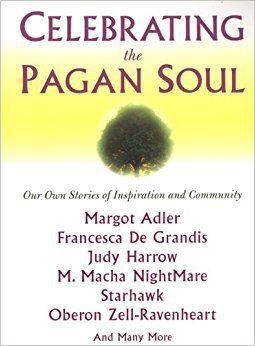 Celebrating The Pagan Soul is a beautiful collection of “stories of inspiration and community” compiled and edited by Laura Wildman. It’s not an introduction to Paganism or a book of instruction or spells, but an anthology of personal stories.
Celebrating The Pagan Soul is a beautiful collection of “stories of inspiration and community” compiled and edited by Laura Wildman. It’s not an introduction to Paganism or a book of instruction or spells, but an anthology of personal stories.The book is nicely organised into five sections, elementally. Earth is about community including finding our way home to Paganism and the families we create that nourish us. It contains stories by Margot Adler and Judy Harrow. Two of my favourites were “A Witch is Seldom Alone” by Cat Chapin-Bishop, who always manages to communicate something so special, and “Sharing a Common Flame”, a beautiful Yule ritual that Wildman recounts (and that I will surely borrow).
Air is about the learning process – teachers, students, mentors, and inner guides. We hear from Francesca De Grandis, T. Thorn Coyle, Wren Walker, Frederic Lamond, and Ellen Evert Hopman. One of my favourites here is John Yohalem’s “Leon’s Template” about the people that show us the path and those who discover it. There is value in both formal training and the spontaneity of those who are simply inspired from within to know exactly what they are supposed to do.
Fire is about magical transformation. M. Macha NightMare, Carl McColman, Oberon Zell-Ravenheart, Penny Novack, Sue Curewitz Arthen, and others share stories of magic, transformation, and life passages. One interesting essay from K.A. Laity, a medievalist, explores the treasury of witchcraft, charms, and hexes found in medieval texts.
Water is about the seasons and cycles of life. It includes stories of marriage, children, life, and death from Patricia Monaghan, Barbara Ardinger, Michael York, and many others. Finally, Spirit contains stories of the Gods and Goddesses in our lives from Starhawk, Grey Cat, and others.
Celebrating the Pagan Soul brings together people from various traditions including Witches and Wiccans, Heathens, Druids, and Recons, but as I read through it, it wasn’t clear or even particularly important what tradition the writer followed. These stories reveal a humanity that transcends differences in training and traditions. The quality of the writing is very good and although it’s not a guide to Paganism, it is full of insight and inspiration.

Sounds like quite the anthology! I'll have to check it out. Thanks for making me aware of its existence.– Jarred.
I've read several of these kind of anthologies now and this one is among my favorites.Thanks for your comments.
Wow, I never heard of this one. Looks like a must-have.
Wow! Nice review, Cosette–and thanks so much for the kind words. I really value your freshness and openness in how you look at the world, so good words from you mean a lot. (I guess it's a writer's thing–it's so nice to be appreciated by someone else when you are also a fan of theirs.)I just wanted to add how meaningful it was to me, watching as Laura worked on this book. It would have been pretty easy to churn out a formulaic anthology of feel-good Pagan essays at the point when Laura was compiling it; from her comments, you could tell the publishers were not very insightful about Paganism, and Laura could have just cobbled together bits and pieces from big name, published Pagans, and made them happy.Instead, I know she took a lot of trouble to pull together a much more balanced anthology, looking to pull from lesser-known writers as well as the “names” that are out there, and always looking for stories that would move people, and convey a bit of what it is to live a Pagan _life_, not just attend a ritual here and there.I think she was very successful. I know it is absolutely my favorite of her books–though I will also say that a night of trivial pursuit we all played based on her _What's Your Wicca IQ?_, back when she was developing that title, was a total blast. I recommend it for large, noisy groups of Pagan extroverts, looking to have loud, laughing fun.Thanks again for all you do!Blessed Be.